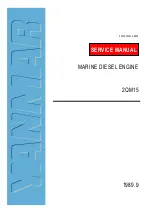
Section 3 - On The Water
Page 26
90-899883179 OCTOBER 2007
Safe Boating Suggestions
To safely enjoy the waterways, familiarize yourself with local and all other governmental
boating regulations and restrictions and consider the following suggestions.
Know and obey all nautical rules and laws of the waterways.
• We recommend that all powerboat operators complete a boating safety course. In the
US, the U.S. Coast Guard Auxiliary, the Power Squadron, the Red Cross, and your
state or provincial boating law enforcement agency provide courses. For more
information in the US, call the Boat U.S. Foundation at 1‑800‑336‑BOAT (2628).
Perform safety checks and required maintenance.
• Follow a regular schedule and ensure that all repairs are properly made.
Check safety equipment on board.
• Here are some suggestions of the types of safety equipment to carry when boating:
•
Approved fire extinguishers
•
Signal devices: flashlight, rockets or flares, flag and whistle or horn
•
Tools necessary for minor repairs
•
Anchor and extra anchor line
•
Manual bilge pump and extra drain plugs
•
Drinking water
•
Transistor radio
•
Paddle or oar
•
Spare propeller, thrust hubs, and an appropriate wrench
•
First aid kit and instructions
•
Water‑proof storage containers
•
Spare operating equipment, batteries, bulbs and fuses
•
Compass and map or chart of the area
•
Personal flotation device (1 per person on board)
Watch for signs of weather change and avoid foul weather and rough-sea boating.
Tell someone where you are going and when you expect to return.
Passenger boarding.
• Stop the engine whenever passengers are boarding, unloading or are near the back
(stern) of the boat. Shifting the drive unit into neutral is not sufficient.
Use personal flotation devices.
• Federal Law requires that there be a U. S. Coast Guard approved life jacket (personal
flotation device), correctly sized and readily accessible for every person on board, plus
a throwable cushion or ring. We strongly advise that everyone wear a life jacket at all
times while in the boat.
Prepare other boat operators.
• Instruct at least 1 person on board in the basics of starting and operating the engine
and boat handling in case the driver becomes disabled or falls overboard.
Do not overload your boat.
• Most boats are rated and certified for maximum load (weight) capacities (refer to your
boat capacity plate). Know your boat's operating and loading limitations. Know if your
boat will float if full of water. When in doubt, contact your authorized Mercury MerCruiser
dealer or the boat manufacturer.
Ensure that everyone in the boat is properly seated.
Содержание MerCruiser 4.3 TKS
Страница 8: ...Page iv 90 899883179 OCTOBER 2007...
Страница 20: ...Section 1 Warranty Notes Page 12 90 899883179 OCTOBER 2007...
Страница 46: ...Section 3 On The Water Notes Page 38 90 899883179 OCTOBER 2007...
Страница 92: ...Section 5 Maintenance Notes Page 84 90 899883179 OCTOBER 2007...
Страница 114: ...Section 6 Storage Notes Page 106 90 899883179 OCTOBER 2007...
















































